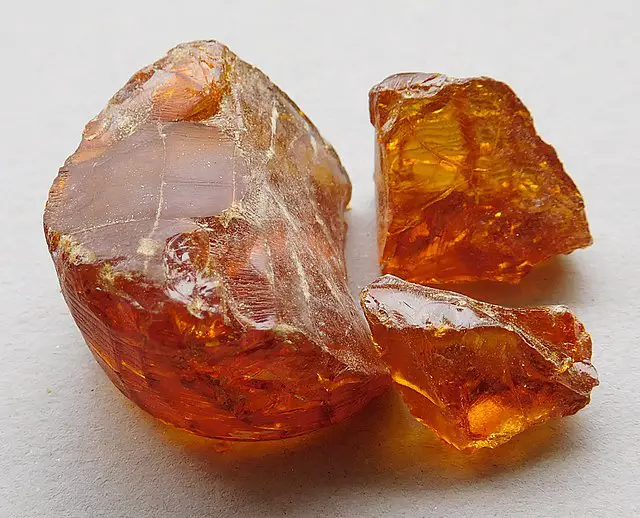As a violinist, adding rosin to your bow is essential in improving sound quality. Applying the rosin on the bow will increase the friction of the bow’s sleek horsehair that grabs the violin strings, producing an even sound. If you have used violin rosin before, you have likely noticed the distinctive smell of the substance.
This strong odor has led many violinists to wonder about the toxicity of the rosin and if they should be worried. If you are curious about the toxicity levels of violin rosin, keep reading further. This article will cover what rosin is, what happens if you eat it, and any side effects of inhaling it.
Is Violin Rosin Toxic?
Violin rosin is not a toxic substance, and there is no evidence linking it as the cause of severe illness. While rosin is not intended for consumption, most violin rosin derives from tree sap, which is non-toxic. However, the taste is very bitter and will likely cause a stomach ache.
Table of Contents
What is Violin Rosin Made Of?
Due to the purpose of violin rosin, the material utilized needs to improve the friction of the bow’s horsehair. The most common material used in violin rosins is tree resin collected from various pine trees. As manufacturers drain the tree sap, they will bake it at high temperatures to create the hardened version.

There are two main types of violin rosin: light and dark variations. The lighter rosins are less dense and sticky compared to the darker version. While the main ingredient is pine tree resin, there are other additives that manufacturers will add to the violin rosin. Some of the most common additives are:
- Beeswax
- Essential Oils
- Metals (Gold, Silver, and Copper)
These violin rosin additives increase the friction on the violin strings and improve the product’s longevity. Additionally, pure violin rosins have no added essential oils or metals for those with allergies. Every violinist will have different preferences regarding rosin, so it’s best to try different types.
What Would Happen if You Eat Violin Rosin?
Now that you know what violin rosin is made from, you may wonder what happens if you consume it. Since it’s hardened tree sap, there will likely be no severe consequences for eating violin rosin. However, you will likely experience stomach troubles after eating a significant amount of it and we really wouldn’t recommend it.
Some of the rare effects of eating violin rosin will happen if you are allergic to pine trees. Individuals with severe pine tree allergies can experience difficulty breathing or swelling of the tongue. However, this is generally rare and is not a topic of concern for most people.
Is Violin Rosin Poisonous?
According to a study conducted by ToxLogic LLC, rosin has minimal toxicity in human participants. There were no changes observed in the organs, and there was no evidence of toxicity at any dose. If you or a child accidentally consumes violin rosin, you will likely be free from serious adverse effects.
What does Rosin Taste Like?
For those brave enough to test what violin rosin tasted like, it’s reported to have an extremely bitter and sour taste. People report the taste lingering in their mouth no matter how many times they try washing it out. It’s safe to say that you should not eat violin rosin intentionally, as there are no benefits whatsoever.
Is Breathing in Violin Rosin Dust Harmful? (What Happens if You Breathe in Violin Rosin)
After applying the violin rosin on your bow, there will be a cloud of white dust coming off the bow while playing. As you play, you will likely inhale the violin rosin dust, which is a concern of many violinists. Breathing in tiny particles can aggravate chronic conditions like asthma for some people.
There is no data or studies on the adverse effects of inhaling violin rosin dust long-term. However, data links a common ingredient in rosin to lung cell damage. Abietic acids are found in pine resins and may cause damage to lung cells. The data is limited, but this could be a cause for concern.
What Safety Precautions Should you Take When Using Violin Rosin?
The chance of adverse effects caused by violin rosin is rare, but you can still take some precautions to minimize potential risks. If you want to avoid inhaling rosin, there are hypoallergenic and dust-free violin rosins. These products will not cause a cloud of dust when you play the violin.
Additionally, it would be best if you never tried eating violin rosin for any reason. Along with protecting yourself, you should keep violin rosins in a secure place away from pets and children. The rosin comes in unique packaging, potentially catching the eye of a curious child who is looking through your violin case.
Is it Safe to Touch Violin Rosin?
Violin rosin is safe to touch, as the material is hardened pine tree resin. The only instance where it would be unsafe is if you have a pine tree allergy. Check the ingredients list of your violin rosin to see if you have any allergies. The materials in most violin rosins are non-toxic, but they can include essential oils or metals.
Is Violin Rosin Toxic to Dogs?
If your dog eats a piece of violin rosin, they will generally be fine and not have severe or lasting effects. However, the rosin may affect the dog’s digestive tract and cause vomiting, but this shouldn’t last long. Call a veterinarian to discuss treatment options for dogs displaying concerning side effects.
Is Violin Rosin Toxic to Cats?
Like dogs, if a cat eats or licks a small amount of violin rosin, it will likely be ok. In most cases, cats dislike the smell and do not consume the violin rosin. If they eat the rosin, monitor their reaction and speak with a veterinarian if you suspect something is wrong. In most cases, the cat will be unaffected.
Final Thoughts
Violin rosin is a key tool in every violinist’s toolkit. The rosin will improve the friction on the bow’s strings and produce a cleaner sound. Fortunately, you likely won’t have to worry about experiencing damaging effects from using violin rosin. The product is made from hardened pine tree resin, which is generally harmless.
However, it is best to keep it out of reach of children and pets. It would also be best to be mindful of reducing the dust produced by the rosin. You can now use violin rosin without stress with these things in mind.
